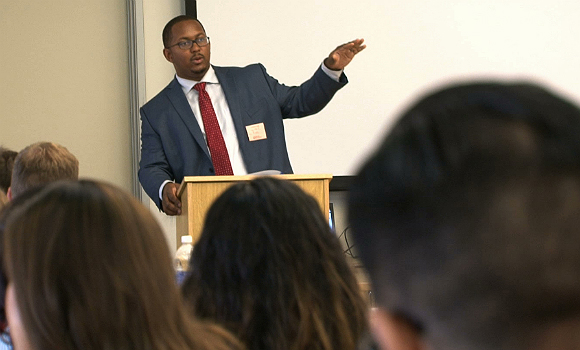Millennials optimistic about future but down on present economy

Long Beach City Council member Rex Richardson speaking at Millennial Economic Summit in Los Angeles this week. (Photo Credit: John Guenther)
At an event on millennials and the economy this week, Long Beach City Council member Rex Richardson pointed out that his generation is made of the first-ever “digital babies.”
“I’m on the older end and I don’t take selfies,” said Richardson. “Fifty-five percent of millennials take selfies.”
But, Richardson, the youngest person elected to the Long Beach City Council, also made the point that younger demographics still care about big economic questions: how to pay for housing and education, finding a good-paying job, and saving for the future.
“Millennials have one of the worst economic outlooks of my generation…We’re likely to change jobs 14 times in our careers,” said Richardson. “However we have some of the best outlook on where we’re going to go.”
Despite a sunnier view of the future, many of those in the 18-34 demographic feel there’s less opportunity right now. That much was clear at a gathering of sub-40-year-old representatives from a range of public policy groups invited to take part in the Millennial Economic Summit in Los Angeles on Thursday.
“For the first time in American history, the millennial generation won’t do as well as their parents and that needs to stop with us,” Kurston Cook of Generation Progress, which co-hosted the event.
Event organizers also discussed research that showed surveyed millennial adults strongly associated a growing middle class as a key feature of a robust economy. At the same time, only a slim majority identified themselves as “middle class.”
“Very few people are satisfied with the economy, mostly because millennials are underemployed, unemployed and face a lot of economic challenges,” said Cook. “The scary element is…how much of it is around insecure economic standing and how they’re worried about their economic future.”
It wasn’t all doom and gloom. While most millennials are worried about the economy, there’s evidence some stability would encourage entrepreneurship in that age range. A little bit would go a long way, especially as participants shared statistics on how the millennials are actually more optimistic about the future than all voters combined.
“The optimism that millennials share is a common characteristic of entrepreneurs,” said Richardson. “Not surprisingly 54 percent want to or have already opened a small business.
Most, however, are waiting on the economy to improve before they invest, there’s a lot of uncertainty there.”
Participants repeatedly that access to education should be an economic priority. The research discussed during the event showed how a big majority of surveyed millennials believed education is an effective tool for improving the economy, not just through traditional college education but also job training programs, apprenticeships, and internships.
“When you invest heavily in things like job training, access to affordable housing, and career preparation, you’re able to create a healthy middle class, which in turn funds all kinds of programs, through taxes, through charitable donations, that millennials are able to make that they wouldn’t have otherwise,” said Angela Elizabeth Perry, a Legal Bridge Fellow for Young Invincibles.
The cost of living, certainly in the large coastal cities in California also puts a squeeze on younger generations, even well after leaving school. A severe lack of affordable housing for the workforce has potential to cause some serious brain drain of high-skilled workers Silicon Valley is seeking.
But the big-ticket item that has risen in cost the most is college education. And, to make the storm perfect, the U.S is creating fewer middle-wage jobs than ever, added Professor Michael Stoll of the UCLA Luskin School of Public Affairs. That makes post-secondary education an absolute necessity.
“College degrees are almost required in order to have a decent standard of living,” said Stoll. “But access to colleges is increasingly difficult for a whole variety of reasons, most importantly because of cost. Then the debt burden that is required to pay back that loan is quite heavy too. So it’s a consequence on future economic rewards as well.”
It’s a giant, interconnected laundry list of problems that will depend on some bottom-up collaboration with all demographics and regions. And the future of the state’s economy depends on holistic and long-view strategies because, even when selfies go out of style, jobs and the economy are always a top concern for Californians.
“It’s going to be a very serious uphill challenge and the scars this recession will become constant unless we take very serious and immediate actions to address those challenges and turn the millennial generation not to be the lost generation in terms of economic growth, but the economic engine that this country and the world needs,” said Cook.
Originally published on CAeconomy.org.

Dr. Ansari on health care’s future amid demographic shifts
Original story on permanente.org During a recent CEO workgroup panel, “Advancing Your Culture…
December 23, 2024
Drs. Hoberman and Nguyen on preparing for health care AI
Original story on permanente.org Many questions surround the advancements of artificial intelligence in…
October 30, 2024